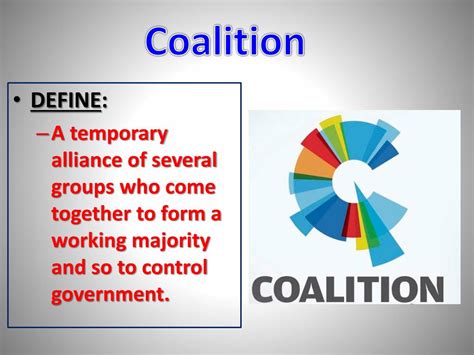In the dynamic landscape of American politics, coalitions play a crucial role in shaping the political agenda and determining electoral outcomes. A party coalition refers to an enduring alliance of different groups within a political party that share common interests, values, and goals. These coalitions form the foundation of party platforms and mobilize support for candidates.

Definition of Party Coalition
A party coalition is a group of individuals and organizations that share a common political ideology and work together to achieve their shared objectives. This alliance is based on a convergence of beliefs, priorities, and strategic considerations. Coalitions can be ideologically cohesive or more diverse, reflecting a broader spectrum of interests within the party.
Types of Party Coalitions
Party coalitions can be categorized based on their ideological orientation:
- Liberal Coalitions: Characterized by a focus on social welfare, economic equality, and environmental protection.
- Conservative Coalitions: Emphasize individual liberty, free markets, and a smaller government role.
- Populist Coalitions: Appeal to the common people, often expressing distrust of elites and a desire for economic fairness.
Formation of Party Coalitions
Coalitions emerge over time through a process of consensus-building and interest aggregation. Political parties develop platforms that reflect the shared values of their members and seek to attract potential allies. Groups with similar goals and preferences align themselves with parties whose ideologies resonate with them.
Importance of Party Coalitions
Party coalitions play a vital role in American politics:
- Mobilizing Voters: Coalitions provide a framework for organizing and motivating voters to participate in elections.
- Shaping Policy Agendas: The priorities and demands of coalitions influence the development of party platforms and legislative initiatives.
- Building Electoral Success: Parties that successfully build and maintain strong coalitions increase their chances of electoral victory.
Example: The “New Deal Coalition”
One of the most influential party coalitions in American history was the “New Deal Coalition” formed by President Franklin D. Roosevelt’s Democratic Party during the Great Depression. This coalition included farmers, white southerners, ethnic and racial minorities, and labor unions. The shared experience of economic hardship and the Roosevelt administration’s transformative policies solidified their alliance.
Table 1: Why Party Coalitions Matter
| Why They Matter | Benefits |
|---|---|
| Voter Mobilization | Increased turnout, representation of diverse interests |
| Policy Agenda | Focus on priorities that resonate with constituents |
| Electoral Success | Mobilization of supporters, increased vote share |
Table 2: How Party Coalitions Benefit Different Groups
| Group | Benefits |
|---|---|
| Farmers | Agricultural subsidies, crop insurance, farm support programs |
| Minorities | Civil rights protections, affirmative action, increased representation |
| Labor Unions | Collective bargaining rights, minimum wage increases, workplace safety regulations |
Table 3: Pros and Cons of Party Coalitions
| Pros | Cons |
|---|---|
| Ideological Cohesion | Potential for division and internal conflict |
| Mobilization of Voters | Can limit the appeal of the party to broader electorate |
| Electoral Success | Dependence on specific groups for support |
Table 4: FAQs on Party Coalitions
| Question | Answer |
|---|---|
| What is the difference between a party platform and a party coalition? | A platform is a statement of a party’s principles and policy positions, while a coalition is the alliance of groups that supports the party. |
| How do coalitions change over time? | Coalitions can evolve as demographics, economic conditions, and political issues shift. |
| What are some factors that shape party coalitions? | Economic interests, social values, cultural identities, and demographic characteristics. |
| Why do political parties form coalitions? | To build electoral support, advance their agendas, and gain power. |
| What is the impact of party coalitions on the political process? | Coalitions influence the outcome of elections, the formation of legislation, and the direction of public policy. |
Conclusion
Party coalitions are the backbone of American politics. They mobilize voters, shape policy agendas, and determine electoral outcomes. Understanding the formation, dynamics, and implications of party coalitions is essential for comprehending the complexities of the American political system. Strong party coalitions provide a foundation for stable and effective governance, ensuring that diverse interests are represented and the needs of the public are addressed.
